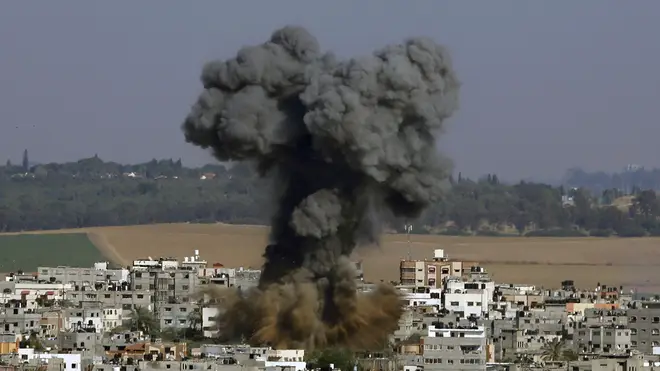
Vanessa Feltz 3pm - 6pm
11 May 2021, 21:24

The exchange killed a number of militants and civilians in Gaza and at least three Israelis.
A confrontation between Israel and Hamas sparked by weeks of tensions in Jerusalem has escalated as Israel unleashed new air strikes on Gaza while militants barraged Israel with hundreds of rockets.
The exchange killed a number of militants and civilians in Gaza and at least three Israelis.
The barrage of rockets from the Gaza Strip and air strikes into the territory continued almost non-stop throughout the day, in what appeared to be some of the most intense fighting between Israel and Hamas since their 2014 war.
The fire was so relentless that Israel’s Iron Dome rocket defence system seemed to be overwhelmed, while columns of smoke rose from many places in Gaza.
By late Tuesday, the violence extended to Tel Aviv, which came under fire from a barrage of rockets launched from the Gaza Strip.
Israel’s transportation authority said it was closing the country’s main international airport near the city.
Hamas said it launched a total of 130 rockets, its most intense strike so far, in response to Israel’s destruction of a high-rise building in Gaza earlier in the evening.
The sound of the outgoing rockets could be heard in Gaza. As the rockets rose into the skies, mosques across Gaza blared with chants of “God is great”, “victory to Islam” and “resistance”.
Since sundown on Monday, 28 Palestinians — including 10 children and a woman — have been killed in Gaza, most by air strikes, health officials there said. The Israeli military said at least 16 of the dead were militants.
Two women were killed by rockets fired from Gaza that hit their homes in the southern city of Ashkelon — the first Israeli deaths in the current violence – and a 50-year-old woman was killed by the barrage on Tel Aviv. At least 10 other Israelis have been wounded since Monday evening.

Israeli prime minister Benjamin Netanyahu warned that the fighting would continue for some time. In a nationally televised speech late on Tuesday, he said Hamas and Islamic Jihad “have paid, and will pay, a heavy price”, adding: “This campaign will take time, with determination, unity and strength.”
Egyptian officials said they were trying to broker a ceasefire, but the cycle of violence was gaining momentum. Even before the two Israeli deaths, the Israeli military said it was sending troop reinforcements to the Gaza border, and the defence minister ordered the mobilisation of 5,000 reserve soldiers.
Lieutenant Colonel Jonathan Conricus, a military spokesman, told reporters that Israel was beefing up defensive forces on the border to prevent possible infiltrations and increasing its offensive forces as well, primarily in the air.
He said the objective was to send a “clear message” to Hamas.
The barrage of rockets and air strikes was preceded by hours of clashes on Monday between Palestinians and Israeli security forces, including dramatic confrontations at Jerusalem’s Al-Aqsa Mosque compound, a sacred site to Jews and Muslims.

The current violence, like previous rounds, including the last uprising, has been fuelled by conflicting claims over Jerusalem, which is at the emotional core of the long conflict.
In a sign of widening unrest, hundreds of residents of Arab communities across Israel staged overnight demonstrations denouncing the recent actions of Israeli security forces against Palestinians. It was one of the largest protests by Palestinian citizens in Israel in recent years.
In the central Israeli town of Lod, police fired tear gas and stun grenades after mourners threw rocks at officers during the funeral of an Arab man allegedly shot by a Jewish resident the night before.
Thousands took part in the funeral, and police said the crowd set fire to a patrol car, a bus and a motorcycle. Two police officers were injured.
Israel and Hamas have fought three wars and numerous skirmishes since the militant group seized control of Gaza in 2007. Recent rounds of fighting have usually ended after a few days, often helped by mediation by Qatar, Egypt and others.